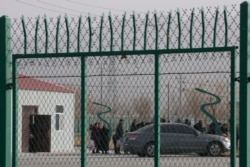Technology giant Alibaba Group Holding Ltd. has facial recognition technology that can specifically pick out members of China's Uighur minority, surveillance industry researcher IPVM said in a report.
Alibaba itself said it was dismayed a unit developed software that can tag ethnicity in videos, and that the feature was never intended to be deployed to customers.
The report comes as human rights groups accuse China of forcing more than 1 million Muslim Uighurs into labor camps in the region of Xinjiang and call out firms suspected of complicity.
China has repeatedly denied forcing anyone into what it has called vocational training centers and has also said Xinjiang is under threat from Islamist militants.
Still, sensitivities have prompted caution among Chinese internet firms that often self-censor to avoid running afoul of a government that strictly controls online speech and that last month published draft rules to police livestreaming.
Report's findings
U.S.-based IPVM in a report published Wednesday said software capable of identifying Uighurs appears in Alibaba's Cloud Shield content moderation service for websites.
Alibaba describes Cloud Shield as a system that "detects and recognizes text, pictures, videos and voices containing pornography, politics, violent terrorism, advertisements and spam, and provides verification, marking, custom configuration and other capabilities."
An archived record of the technology shows it can perform such tasks as "glasses inspection," "smile detection," whether the subject is "ethnic" and, specifically, "Is it Uighur?"
Consequently, if a Uighur livestreams a video on a website signed up to Cloud Shield, the software can detect that the user is Uighur and flag the video for review or removal, IPVM researcher Charles Rollet told Reuters.
IPVM said mention of Uighurs in the software disappeared near the time it published its report.
Alibaba's response
Alibaba in a statement said it was dismayed that Alibaba Cloud developed facial recognition software that includes ethnicity as an attribute for tagging video imagery, and that it never intended the software to be used in this manner. The feature was trial technology not intended for customers.
Alibaba did not mention Uighurs in its statement.
"We have eliminated any ethnic tag in our product offering," an Alibaba spokeswoman told Reuters.
Alibaba is listed on both the New York and Hong Kong stock exchanges. It is the biggest cloud computing vendor in China and the fourth biggest worldwide, showed data from researcher Canalys.
Earlier this month, U.S. lawmakers sent letters to Intel Corp. and Nvidia Corp. following reports of their computer chips being used in the surveillance of Uighurs.






